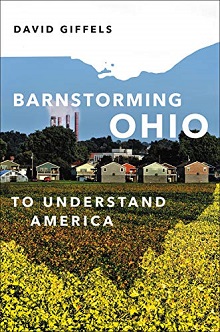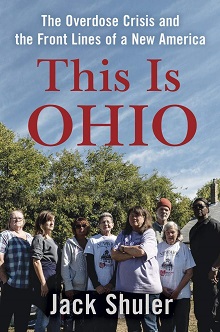Two New Books Explore the Battleground State of Ohio | Review Spotlight
Giffels writes an exploration of Ohio with care and sensitivity, while Shuler gives people the opportunity to speak up and be heard.
 Giffels, David. Barnstorming Ohio: To Understand America. Hachette. Aug. 2020. 272p. ISBN 9780306846397. $28. SOC SCI
Giffels, David. Barnstorming Ohio: To Understand America. Hachette. Aug. 2020. 272p. ISBN 9780306846397. $28. SOC SCI
Ohio has chosen the presidential winner in 29 of the last 31 elections, and in this latest work, Giffels (journalism, Univ. of Akron; Furnishing Eternity) seeks to discover what makes Ohio a bellwether state. According to Giffels, Ohio is average in politics, climate, economics, and lifestyles, making it an All-American everyplace. The state encompasses large urban and industrial areas as well as swaths of farmland, small towns, and the third largest university in the United States. Giffels’s tour takes readers around the state, where he talks to out-of-work autoworkers in Lordstown uncertain of their future, along with soybean and corn farmers contending with unprecedented rains that threatened to destroy crops and livelihoods. Side trips explore Ohio’s craft brewing industry and its impact on the revitalization of local economies and the over-the-top politician, known as a proto-Trump, Jim Traficant. The book ends as the uncertainty of the Covid-19 pandemic sets in while Ohio’s governor, Mike DeWine, and Health Director, Amy Acton, became guides during the crisis. Written in an engaging and poetic style, this exploration of Ohio is told with care and sensitivity. VERDICT Readers interested in current events and politics will enjoy this highly readable account.—Chad E. Statler, Westlake Porter P.L., Westlake, OH
 Shuler, Jack. This Is Ohio: The Overdose Crisis and the Front Lines of a New America. Counterpoint. Sept. 2020. 304p. ISBN 9781640093553. $26. SOC SCI
Shuler, Jack. This Is Ohio: The Overdose Crisis and the Front Lines of a New America. Counterpoint. Sept. 2020. 304p. ISBN 9781640093553. $26. SOC SCI
This profoundly humanizing investigation surveys the opioid addiction and overdose crisis as experienced in the Ohio community of Newark, east of Columbus. Shuler (The Thirteenth Turn) teaches at nearby Denison University and travels through the Ohio epicenter of the opioid crisis, from Dayton to Portsmouth. He meets and walks with many people who use drugs, and many more who care about and advocate for them. Like the meetings, events, shelters, and grassroots service projects he visits, Shuler’s book gives the opportunity for people to speak up and be heard. A tremendous stigma is attached to drug use, yet users are capable, productive, human, and need to be included in the development of solutions. Lived experience is key to understanding and addressing addiction, which Shuler identifies as a public health problem, and an economic and social problem encompassing race, poverty, and power. VERDICT The commitment, tenacity, and empathy of the users, activists, and advocates Shuler meets is a stark corrective to the disdain and dehumanization typical of policy and practice in this area. The title forcefully claims this story for Ohio, a statistical center, but addiction reaches all places, and this book is strongly recommended for readers anywhere who are interested in systemic change and the power of the grassroots.—Janet Ingraham Dwyer, State Lib. of Ohio, Columbus
RELATED
ALREADY A SUBSCRIBER? LOG IN
We are currently offering this content for free. Sign up now to activate your personal profile, where you can save articles for future viewing









Add Comment :-
Comment Policy:
Comment should not be empty !!!